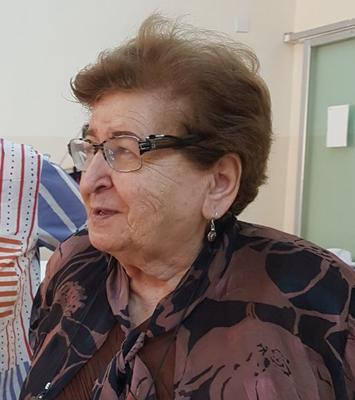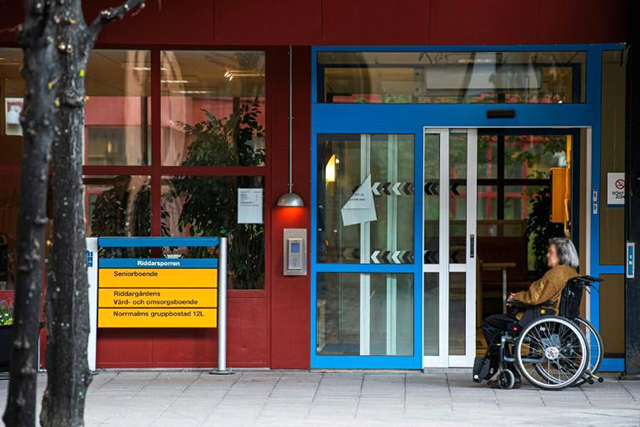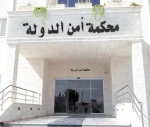You are here
Basheer breaks stigma surrounding nursing, pioneers care for elderly
By Ana V. Ibáñez Prieto - Sep 14,2017 - Last updated at Sep 14,2017

Haifa Al Basheer
AMMAN — When her husband was named Minister of Health in 1970, Haifa Al Basheer came to the realisation that a big issue was threatening the future of the nursing sector-Back then, families in Jordan still believed that nursing was not a dignified profession, being the only sector where men and women worked together — and thus, female nurses were practically non-existent.
In an interview the NGO HelpAge International shared with The Jordan Times, Basheer recalled a night in the 70s when a television show aired members of the religious clergy denouncing the profession. “My husband got frustrated and angry, so he challenged me and asked me to lend a hand,” she said.
Basheer did not hesitate, and, the next morning, she was hosting a gathering in her house to address the issue. Pharmacists, wives of doctors and many other women coming from various professions made it their goal to back the female nurses and encourage them to be part of the profession.
“I went to every governorate in Jordan and spoke about the importance of this profession. A nursing school then opened and offered monetary support for young women to enter the sector. After that, it just blossomed,” said Basheer, recreating on the grassroots efforts that led to the creation of the White Beds Society.
Her early days defending the female nurses shaped the future career of Basheer, who grew to become a King Hussein medal recipient, recognised for her volunteer work founding the Golden Age Home, the Senior Citizens Forum and the Psychiatric Rehabilitation Centre.
The aforementioned organisations were the result of a second inflection point in her career, when the late prime minister Wasfi Al Tal urged people not to forget the elderly in society.
“That is when we made ‘helping senior citizens’ one of our goals,” said Basheer, who started attending international conferences and seminars in order to “provide input on the overall situation in the Middle East and learn how to take care of the elderly.”
After she made sure it suited the culture and environment of the Arab world, the residential facility Golden Age Home was inaugurated in 1979.
However, it did not start off as well as she expected. “I was faced with harsh criticism as it was not accepted by society,” Basheer recalled, noting that she “appreciates the great family structure in Jordan and was not trying to break it”.
“It took society nine years to accept the Golden Age Home,” she continued, explaining that some progress was made after “making it clear to society that this was purely a home for those who needed assistance, and not for families trying to get rid of the elder”.
Thirty-eight years later, the Golden Age Home is now at full capacity.
“This is the best choice I have ever made,” said Um Sumaya, who decided to move to the Golden Age Home after her husband passed away.
“I have no children and I did not want to be a burden for my siblings, so I came here and I can say that it is the best that could happen to me,” she said, noting that she gets to spend her time practicing her passion for gardening while having access to healthcare and all necessary medical attention.
“I chose to live with dignity and Mrs Haifa allowed me to do so,” she said.
“But the White Beds Society did not stop running,” said Basheer, noting that the shift in the trends from the extended to the nuclear family led them to initiate the Seniors Citizens Forum — a non-profit day care centre where elders can socialise and meet their peers.
Stephanie Yousef, Regional Head of HelpAge International in Jordan, told The Jordan Times that the NGO holds “high appreciation” for Basheer’s work in the country, qualifying her as “the miracle for the elderly”.
“Not only is she focused on the elders who are unable to take care of themselves, but she also organises meetings to make sure that the government takes care of the elderly and that their voices are heard,” Yousef concluded.
Related Articles
AMMAN — After a successful battle against cancer, Suzan Murad decided to establish an association to support and advise cancer patients and
ZARQA — Having retired after 20 years of working as a nurse, Ghada Al Khatib had sunk into depression, but the 48-year-old refused to give i
STOCKHOLM — Bjorn Branngard's mother died in a Stockholm nursing home where five of the eight people in her section and more than a third of
















